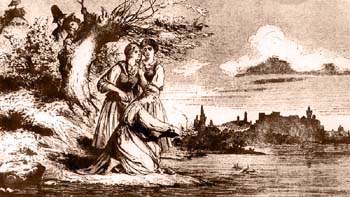|

Wreath floating is
Krakow's ancient summer-solstice tradition.
Folk Customs of the Krakow Region.
Krakow region has always been rich in colorful folk traditions,
handed down from generation to generation, with almost every village
cultivating its own set of time-honored customs. Nowadays, as new
lifestyles spread, some ancient practices are dead but many
flourish.
‘Kolednicy’ carol singers, mostly children, wander with a
Christmas crib from door to door over the holiday season. In reward
for chanting a couple of Polish traditional noels they get some change.
In the past the kolednicy used to be adult and they performed an
elaborate Nativity puppet show.
‘Turon’ is a mask representing the head of the wild bull
(Polish ‘tur’), embodying the dark forces of nature. In the first weeks
of year boys in funny disguises roam the neighborhood with it, romping
and bantering.
‘Babski Comber’ (female haunch) was a 3-day bacchanalia on
Krakow streets launched by the rampant crowd of women, mostly vendors
from the outskirts that took over the city center on the last Tuesday
before the Lent. Frantic females pranced on the
Grand Square, ridiculed males, and forced passers-by into dancing
with them. The custom dating from the Middle Ages died out in 1852 but
recently there have been efforts to revive it as a carnival parade.
‘Pukhery’ (from the Latin ‘puer’, for boy) tradition sets
teenagers with blackened faces and decked in tall straw hats going from
door to door on Palm Sunday with comic orations that earn them small
gifts.
‘Smigus’ means Poland’s universal custom of splashing over
one another with water on the Easter Monday. In
the past village boys used to drench girls for good luck in finding a
husband, whipping them first with willow rods.
‘Smigusnicy’ masqueraders, usually sporting mock-military
uniforms, wander the neighborhoods on the Easter
Monday. One place they push a wheelbarrow with tiny flower garden and
sing an ancient song about souls rambling meadows. Elsewhere they carry
an image of Christ Resurrected and sing a medieval song about barefoot
Mother of God fetching well-water and asking children at a green meadow
if they saw Her Son. Those masqueraded as a hag play pranks and demand a
token ransom from passers-by.
‘Wianki’, or wreaths floating, is part of the all-night
open-air festivities by bonfires on St. John’s Day, June 24, celebrating
the summer solstice. Girls put flower-and-magic-herbs garlands adrift
down a river and watch. If a boy snatches your wreath, you will marry
soon. If it sinks, you will die young. And whenever it couples with
another girl’s wreath you may count on a life-long friendship.
‘Zielone Swiatki’ Whitsunday feast is the occasion for
joyful gatherings at night by numerous bonfires.
‘Dozynki’ harvest festivals amount to yearly summer
fiestas in August when villagers celebrate their new grain crop. |
